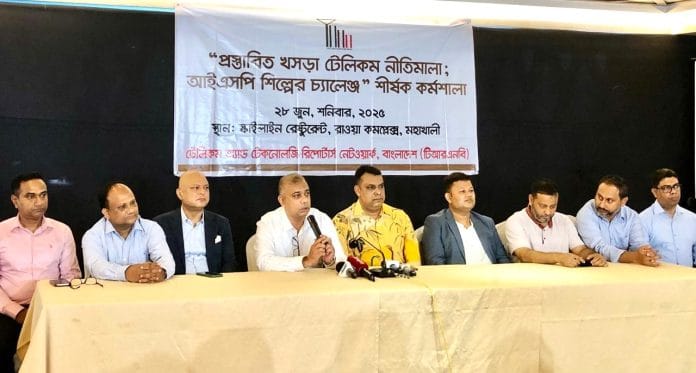The Internet Service Providers Association of Bangladesh (ISPAB) has submitted a seven-point demand to the government, urging protection for local entrepreneurs and reforms in internet pricing and infrastructure policies.
The demands include setting a floor price for broadband internet, introducing both floor and ceiling pricing structures, implementing active sharing of infrastructure, ensuring last-mile connectivity remains under ISP control, reducing NTTN service charges to single digits for long-haul connections, abolishing Social Obligation Fund (SOF) and revenue sharing, and prioritizing protection for local investors.
The demands were presented at a workshop titled “Draft Telecom Policy and Challenges in the ISP Industry,” organised by the Telecom Reporters’ Network Bangladesh (TRNB) at the RAOWA Club in Mohakhali on Saturday.
ISPAB’s key demands include:
- Setting floor and ceiling prices for internet packages
- Fixing the minimum price of a 50 Mbps package at Tk 800
- Introducing active network sharing to improve service quality and reduce internet costs
- Retaining last-mile connectivity under ISP jurisdiction
- Reducing NTTN service charges to single-digit rates
- Eliminating Social Obligation Fund (SOF) and revenue sharing requirements
- Ensuring protection for local entrepreneurs
Speaking at the event, ISPAB President Aminul Hakim described the draft telecom policy as the most contradictory regulatory framework in the past 27 years. “The idea of providing high-speed internet at extremely low prices is unrealistic and politically motivated,” he said. “Private ISPs cannot lower prices unless the government offers tax and policy support. Currently, about 60 percent of ISP revenue is taken in the form of taxes and levies.”
Hakim emphasised the need for a sound and supportive policy to ensure quality service at affordable prices.
ISPAB Secretary General Nazmul Karim Bhuiyan added that the absence of active infrastructure sharing is leading to massive financial losses. “We have already initiated a 1 Gbps shared cable line in Dhanmondi, enabling 77 ISPs to jointly deliver high-speed internet,” he said.
The session was moderated by TRNB President Samir Kumar Dey, while TRNB General Secretary Masuduzzaman Robin gave the welcome address. Other speakers included former ISPAB presidents Abdus Salam and Emdadul Haque, with a comprehensive presentation delivered by Mubarak Hossain.

